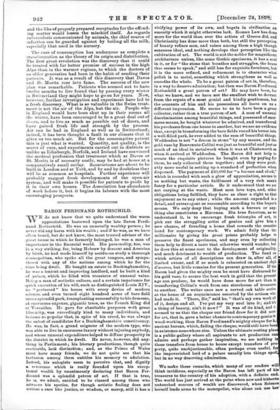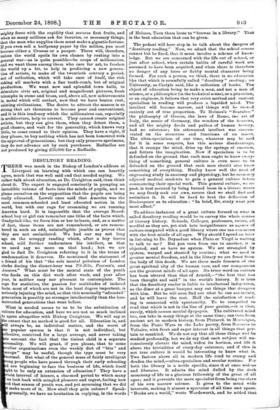BARON FERDINAND ROTHSCHILD.
WE do not know that we quite understand the warm appreciations bestowed upon the late Baron Ferdi- nand Rothschild. He was an unusually wealthy person ; he never did any harm with his wealth ; and if he was, as we have often heard, but do not know, the most trusted adviser of the great house to which he formerly belonged, he was a man of importance in the financial world. His personality, too, was in a way striking, for, being Hebrew by descent and Austrian by birth, he had made himself by assiduous study a thorough cosmopolitan, who spoke all the great tongues, and sympa- thised with any of the nations among which he for the time being dwelt. He bought an estate in Buckinghamshire, he was a lenient and improving landlord, and he built a kind • of palace, which he filled with treasures of unusual value. Beiug a man of sesthetic culture, and a certain impatience for .quiek execution of his will, such as distinguished Louis XIV., he" perfected " his house with every device of modern science, and even turned eight hundred acres of bare field into a splendid park, transplanting successfully to his demesne, at enormous expense, gigantic trees, as the French King did At Versailles. He gave for charitable purposes with great libelaiity, was exceedingly kind to many individuals, and became so popular that, in spite of his creed, he was always the safest of candidates for a Buckinghamshire constituency. He was, in fact, a grand seigneur of the modern type, who was able to live in enormous luxury without injuring anybody, and whose unusual expenditure helped to diffuse prosperity in the district in which he dwelt. He never, however, did any- thing in Parliament ; his literary productions, though quite creditable, lack distinction; and, as the Prince of Wales must have many friends, we do not quite see that his inclusion among them entitles his memory to adulation. Indeed, his eulogists seem to perceive that, and dignify a reverence which is really founded upon his excep- tional wealth by unanimously declaring that Baron Fer- dinand was a splendid patron of art. If that is true, he is, we admit, entitled to be classed among those who advauce his species, for though artistic feeling does not civilise a race like justice, or wisdom, or mercy, still it has a vivifying power of its own, and begets in civilisation an amenity which it might otherwise lack. Roman Law has done more for the world than ever the artists of Greece did, and Christianity has done more than both, but still the perception of beauty refines men, and raises among them a high though sensuous ideal, and nothing develops that perception like the cultivation of art. The world is not the nobler for magnificent architecture unless, like some Gothic specimens, it has a soul in it, or for "the stone that breathes and struggles, the brass that seems to speak," and still less for exquisite furniture, but it is the more refined, and refinement is to character what polish is to metal, something which strengthens as well as smooths the whole. To be a great patron of art is, therefore, in a way to deserve admiration; but then was Baron Ferdinand Rothschild a great patron of art ? He may have been, for what we know, and we have not the smallest wish to detract from the repute of a most genial and kindly gentleman, but the accounts of him and his possessions all leave on us a different impression. He seems to us to have been a great collector, rather than a true patron of art. A man of unusual discrimination among beautiful things, and possessed of enor- mous means, he bought whatever he admired, and transferred his purchases from one house to another, but we see no evidence that, except in transforming the bare fields round his house into a well-filled park, he ever added to the sum of beautiful things. Waddesdon is not "a dream in atone" by any means, and the gold vase by Benvenuto Cellini was just as beautiful and just as much of an ideal in metalwork when it was at Chatsworth as when it arrived at Waddesdon. The Baron did not help to create the exquisite pictures he bought even by paying for them, he only collected them together; and they were prob- ably more useful in setting up a standard of perfection when dispersed. The payment of £40,000 for "a bureau and clock," which is recorded with such a glow of appreciation, seems to us nothing but waste, the fulfilment of a very rich man's fancy for a particular article. Be it understood that we are not carping at the waste. Most men love toys, and, other obligations being fulfilled, they have as clear a right to that enjoyment as to any other ; while the amount expended is a detail, and extravagant or reasonable according to the buyer's means. We only deny that buying such a bureau or any. thing else constitutes a Mmeenas. His true function, as we understand it, is to encourage fresh triumphs of art, to pick out the struggling artist of genius and give him a new chance, of founding a home that rewards the creative hand for contemporary work. We admit fully that the millionaire by giving his great prices probably helps to preserve the finest specimens, and may even by collecting
them help to direct a taste that otherwise would wander, but he does this at some cost to the development of originality,
and much detriment to wealth of production. The fund on which artists of all descriptions can draw is, after all, of limited extent, and if so much is exhausted on ancient chefs d'ceuvres, but little remains for the present generation. If the Baron had given the mighty sum he must have disbursed for his gold vase, to secure the best work in gold that the present
age can produce, he would have done more for art than in
transferring Cellini's work from one storehouse of treasures to another. The writer once saw a carved oak table arrive
at the house of an acquaintance escorted by the artisan who
had made it. "There, Sir," said he, "that's my own work all of it, design and all. I've put my very soul into it; and it's a thing of beauty, ain't it now?" It was of its kind, and it
seemed to us that the cheque our friend drew for it did more for art, that is, gave a better chance to contemporary genius in
wood-working, than Baron Ferdinand's mighty cheque for li ancient bureau, which, failing the cheque, would still have bee in existence somewhere else. Unless the ultimate resting pla is a public gallery where all aspirants to art production admire and perhaps gather inspiration, we see nothing these transfers from house to house except transfers of pr perty, quite unobjectionable, often perhaps even useful, fo the impoverished lord of a palace usually lets things op° but in no way deserving admiration.
We make these remarks, which many of our readers will think invidious, especially as the Baron has left part of his treasures to the country of his adoption, with a definite end. The world has just arrived at the point when new and hitherto untouched sources of wealth are discovered, when Science herself lends arms to the monopolist, who alone can use her
mighty force with the rapidity that secures first fruits, and when so many millions ask for luxuries, or necessary things, that the man who supplies them must make a gigantic fortune. If you even sell a halfpenny paper by the million, you must become either a Crcesus or a pauper. There will, therefore, unless the world spoils its own chance by rushing into a general war—as is quite possible—be crops of millionaires, and we want those among them who care for art, to freshen the world up a bit, to help in producing a new genera. tion of artists, to make of the twentieth century a period, not of collection, which will take care of itself, the rich raking all markets with a fine tooth-comb, but of original production. We want new and splendid town halls, to stimulate civic art, original and magnificent pictures, fresh triumphs in stone and brass, and, above all, new achievements in metal which will outlast, now that we have beaten rust, existing civilisations. The desire to attract the masses is so strong that art threatens to become poor and conventional, and it is this tendency which the millionaires can, especially in architecture, help to correct. They cannot create original artists, but they can give them, when they detect them, a good chance, and wait for the generality, which knows very little, to come round to their opinion. They have a right, if they please, to buy nothing which has not been honoured with the approval of generations; but they only preserve specimens, they do not advance art by such purchases. Raffaelles are not produced by giving £70,000 for a Raffaelle.







































 Previous page
Previous page